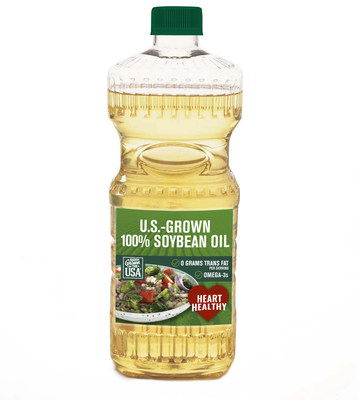Subject: FDA
U.S.-Grown Soybean Oil Achieves FDA's Qualified Heart Health Claim
ST. LOUIS, Aug. 1, 2017 /PRNewswire/ -- The Food and Drug Administration authorized the use of a qualified health claim confirming soybean oil's ability to reduce the risk of coronary heart disease.1 Soybean oil is the most widely used edible oil in the United States.2 Most oils sold as vegetable oil are soybean oil.

The new heart healthy claim, which food manufacturers are encouraged to add to the label of qualified soybean oil and soybean oil-containing products*, states: "Supportive but not conclusive scientific evidence suggests that eating about 1½ tablespoons (20.5 grams) daily of soybean oil, which contains unsaturated fat, may reduce the risk of coronary heart disease. To achieve this possible benefit, soybean oil is to replace saturated fat and not increase the total number of calories you eat in a day. One serving of this product contains [x] grams** of soybean oil."1
The claim is supported by a comprehensive review of scientific literature and recommendations from governmental and professional organizations.1
"We conclude strongly that lowering intake of saturated fat and replacing it with unsaturated fats, especially polyunsaturated fats, like those found in soybean oil, will lower the incidence of cardiovascular disease," said Penny M. Kris-Etherton, co-author of "Dietary Fats and Cardiovascular Disease, A Presidential Advisory from the American Heart Association" published in June 2017.3
Most soybean oil is made with U.S.-grown soybeans and has a favorable fatty acid composition, containing 0 grams of trans fat and just 2 grams of saturated fat per 1 tablespoon serving.4 It is one of the few non-fish sources of omega-3 polyunsaturated fatty acids.5
Soybean oil's U.S.-grown and heart healthy claims are key factors in driving product sales. According to a study conducted by the United Soybean Board (USB), 63 percent of shoppers are more likely to purchase a product displaying a label stating it was made with U.S.-grown ingredients, and 87 percent are more likely to purchase U.S.-grown soybean oil after learning the health benefits.6,7 Shoppers are asking for sustainable products and trust U.S.-grown ingredients.
"I take pride in growing a sustainable crop that has the ability to positively impact human health, and look forward to the opportunity to continue to educate the public about the health benefits of soybean oil," said Nancy Kavazanjian, USB Farmer-Director.1
*Qualified products have a minimum of 5 grams of soybean oil per reference amount customarily consumed.1
**Gram amount varies by product.
About USB
USB's 73 farmer-directors work on behalf of all U.S. soybean farmers to achieve maximum value for their soy checkoff investments. These volunteers invest and leverage checkoff funds in programs and partnerships to drive soybean innovation beyond the bushel and increase preference for U.S. soy. That preference is based on U.S. soybean meal and oil quality and the sustainability of U.S. soybean farmers. As stipulated in the federal Soybean Promotion, Research and Consumer Information Act, the USDA Agricultural Marketing Service has oversight responsibilities for USB and the soy checkoff. For more information on USB, visit www.unitedsoybean.org.
|
1 U.S. Food and Drug Administration. Soybean Oil and Reduced Risk of Coronary Heart Disease. July 31, 2017. |
|
2 U.S. Department of Agriculture, Economic Research Service: 2016 ERS Oilseed Yearbook. |
|
3 Dietary Fats and Cardiovascular Disease: A Presidential Advisory From the American Heart Association. Frank M. Sacks, Alice H. Lichtenstein, Jason H.Y. Wu, Lawrence J. Appel, Mark A. Creager, Penny M. Kris-Etherton, Michael Miller, Eric B. Rimm, Lawrence L. Rudel, Jennifer G. Robinson, Neil J. Stone, Linda V. Van Horn and On behalf of the American Heart Association. Published online June 15, 2017. |
|
4 USDA National Nutrient Database for Standard Reference. |
|
5 Blasbalg TL, Hibbeln JR, Ramsden CE, Majchrzak SF, Rawlings RR. "Changes in consumption of omega-3 and omega-6 fatty acids in the United States during the 20th century." Am J Clin Nutr. 2011; 93:950-62. |
|
6 2017 United Soybean Board Food Industry Insights annual survey. |
|
7 2015 Post-promotion consumer survey conducted by the United Soybean Board. |
SOURCE United Soybean Board
These press releases may also interest you
|
News published on and distributed by:



